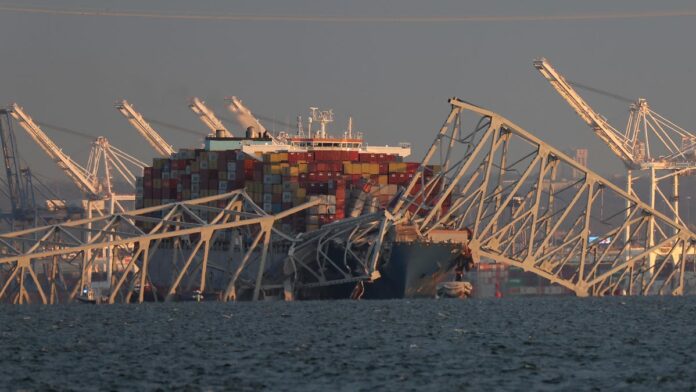The Port of Baltimore is expected to be closed indefinitely as U.S. federal and state officials in Maryland deal with the aftermath of the collapse of the Francis Scott Key Bridge. The “mass casualty event” is not only a tragedy with rescue efforts still underway, but an infrastructure crisis that’s shutting down sea traffic at one of the world’s busiest ports.
The bridge collapsed early Tuesday morning after it was hit by a cargo ship, the DALI. The vessel was chartered by Maersk and was leaving the port loaded with cargo, but crewed by workers employed by Synergy Group, which confirmed that its 22 employees were uninjured. Six people performing repairs and other work on the bridge are unaccounted for, according to Maryland Transportation Secretary Paul J. Wiedefeld.
“The Francis Scott Key bridge tragedy will impact many supply chains on the U.S. East Coast,” Patrick Penfield, a professor of supply chain management at Syracuse University, told Quartz. “Over 11 million vehicles use that bridge on a yearly basis and [it’s] a critical road for the Baltimore transportation network.”
The Maryland Department of Transportation’s Port Administration said Tuesday that vessel traffic in and out of the Port of Baltimore is suspended indefinitely, although trucks are still being processed.
The Port of Baltimore is an $80 billion link in the global supply chain
The port handled 52.3 million tons of foreign cargo, worth $80 billion, in 2023. Every month that the vessel traffic through the port is shuttered, more than $6 billion of cargo doesn’t pass through.
The port is a significant participant in the supply chains for the automotive and energy industries. More than 847,000 cars and light trucks moved through the port last year, the 13th consecutive year it has led all other U.S. ports for autos. Nissan, Toyota Motor, General Motors, Volvo, Jaguar Land Rover, and the Volkswagen Group use the port for imports and exports.
John Lawler, the chief financial officer for Ford Motor Co., told Bloomberg Television that on Tuesday, the automaker would begin re-routing auto parts to other ports on the East Coast. GM said in a statement that it is working to re-route vehicle shipments to different ports and expects a “minimal impact” on its operations. Volkswagen expects trucking delays due to re-routed traffic on land but no maritime issues.
The port also creates about 15,300 direct jobs and 139,180 jobs connected to work at the port and generates nearly $3.3 billion in total personal income.
“This is going to be catastrophic for many reasons,” a Baltimore resident told local CBS affiliate WJZ. “Amazon is just on the other side of the river, and you can forget your same-day, next-day delivery packages. The beltway is going to be a parking lot. The tunnels are going to be over-jammed.”
FedEx, Under Amour, and BMW also have distribution facilities on the north end of the bridge alongside Amazon.
Ernie Thrasher, the CEO of Pennsylvania-based Xcoal Energy and Resources, told Bloomberg that the bridge collapse could stop coal shipments out of Baltimore for up to six weeks. That would block as much as 2.5 million tons of coal; the city ships about 20 million tons yearly, much of which goes to India.
More than 40 ships remained inside the port, according to data from ship tracking and maritime analytics provider MarineTraffic. At least 30 other vessels had signaled their destination was Baltimore.
Maersk, which chartered the DALI, said Tuesday it would omit Baltimore from all its services “for the foreseeable future, until it is deemed safe for passage through this area.” Cargo already en route to Baltimore will be discharged in nearby ports and finished their routes through trucks and other land transportation.


